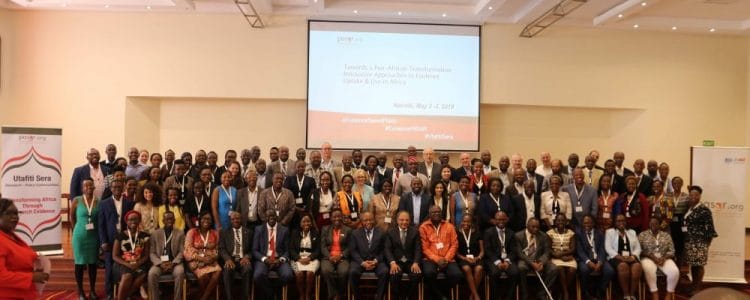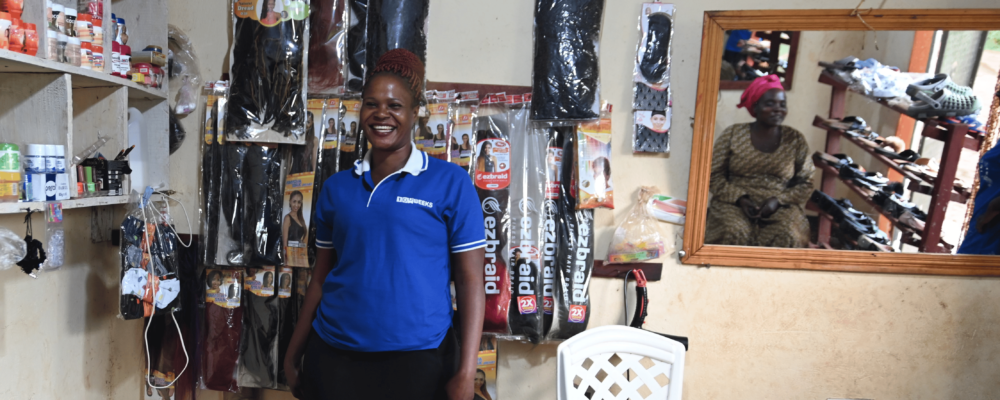
In recent times, there have been growing calls to use research evidence in the formulation and implementation of policies and programmes. Evidence-based policies and programmes are more likely to bring about expected outcomes, including the transformation of economies and the improvement of people’s livelihoods. To deliberate on innovative approaches to evidence uptake in Africa, over 100 policymakers, researchers, activists, funders and implementors gathered in Nairobi, Kenya from 2–3 May 2019. The conference, which was hosted by the Partnership for African Social and Governance Research (PASGR), considered the potential transformation that a strong network of stakeholders interested in evidence-based decision making can achieve. The participants discussed concrete ways that researchers have employed in their work with policy actors to enhance the use of evidence in policy processes.
Utafiti Sera and INCLUDE’s African Policy Dialogues
During the conference, participants debated various approaches to evidence-based policy in Africa and the political economies and cultures that facilitate or inhibit the use of evidence in policy processes. One of the approaches featured was Utafiti Sera (research policy). This approach was pioneered in 2015 by PASGR, INCLUDE and other partners in response to the weakness of approaches based on a linear relationship between research and policy needs. Utafiti Sera’s approaches facilitate the building of a community of stakeholders working together to ensure that appropriate and negotiated civic action and policy uptake occur around a particular public problem for which there is research evidence. INCLUDE is proud to have partnered with PASGR and other partners in the use of Utafiti Sera’s approaches in encouraging the use of evidence in six African countries. After a successful first phase, drawing on the Utafiti Sera model, PASGR is working with other partners to implement four new communities on urban governance and city transformation in Nairobi and Kigali, and social protection and youth employment creation in agribusiness in Kenya. Based on the lessons learnt, INCLUDE is employing an innovative approach known as African Policy Dialogues (APDs), which involves a network of policy actors in a given sector thatidentify priority policy issues where evidence is lacking, generate the evidence and use the evidence to inform policies and programmes. In the coming four years, INCLUDE will work with other partners to establish seven APDs.
What are the features of innovative approaches to evidence-based decision making?
The participants discussed the features of innovative approaches to evidence uptake. What is the evidence, or what counts as evidence, was identified as a critical question. Defining evidence narrowly as only peer reviewed research is inadequate. There is a need to consider whose evidence it is and which evidence is dismissed and which is used in decision making. Innovative approaches are approaches that:
- Consider knowledge exchange and evidence uptake as a socio-political process and not a technical endeavour
- Embrace networks, collaborations and partnerships between actors in the generation and uptake of evidence, which is achieved by getting donors, research organizations, governments and government agencies to work together to manage the tension between the effectiveness of interventions, the results-based agenda, and an increasingly complex and interconnected world
- Provide timely and up-to-date evidence in response to the emerging needs of policy and decision makers, which requires the use of rapid response strategies in the synthesis of evidence and translation of knowledge
- Respond to changing trends, in evidence generation, translation and use
Points to note on enhancing the uptake of evidence
- Evidence uptake is a political and not a technocratic process. This is because resources allocation is a compromise between competing interests and rarely an aggregation of individual preferences. This requires understanding power dynamics.
- Personal networks and relationships with policymakers or politicians or individuals trusted by politicians are essential. These networks and individuals can be used as policy champions to influence politicians to use evidence in policy processes.
- Innovative approaches have the potential to change the narratives that inform decision making. It is important to show politicians and decision makers how they can benefit from evidence in decision making. In addition, emphasis should be on the institutionalization of evidence in government, rather than merely demand engagement.
- Adopting a culture of evidence making within government is a long-term, systematic investment that needs to go beyond rhetoric and sporadic short-term interventions.
- The uptake of evidence requires involvement beyond research dissemination and is about active involvement in the entire policy process and chain.
- There is a need to understand the policy environment, how it is changing and how these changes are being dealt with. This includes understanding the political economy context and policy cultures, and how they influence and impact on evidence uptake.
- Youth should be involved in evidence uptake policy processes, which may require building their capacity to be practitioners.
- Because use of scientific research evidence in policy and programme processes remains limited in Africa, there is a need to document the limited capacity for the use of evidence as a key factor in increasing evidence use. Consequently, there is need to be realistic about evidence use and what can be achieved.
Questions whose answers can enhance evidence-based decision making
Based on the experiences of the delegates, several questions were raised whose answers can enhance evidence-based decision making in different fields. Those involved in the use of evidence in the formulation and implementation of policies and programmes were encouraged to consider the following questions:
- Are there certain political climates that make it easier or possible to share evidence and counter narratives?
- Which strategies are effective in bringing together diverse actors and building partnerships?
- To what extent, and how, should the naysayers be incorporated and engaged in evidence-based decision making?
- Which innovative ways should be employed to reach out to diverse stakeholders?
- How do we measure evidence use and how do we measure the success of evidence-based policy strategies?
- What is the value of evidence in decision making, especially for governments?
- Which strategies can strengthen the capacity for the use of evidence in policies and programmes and which aspects of capacity most influence the use of research?












Good one…I like it